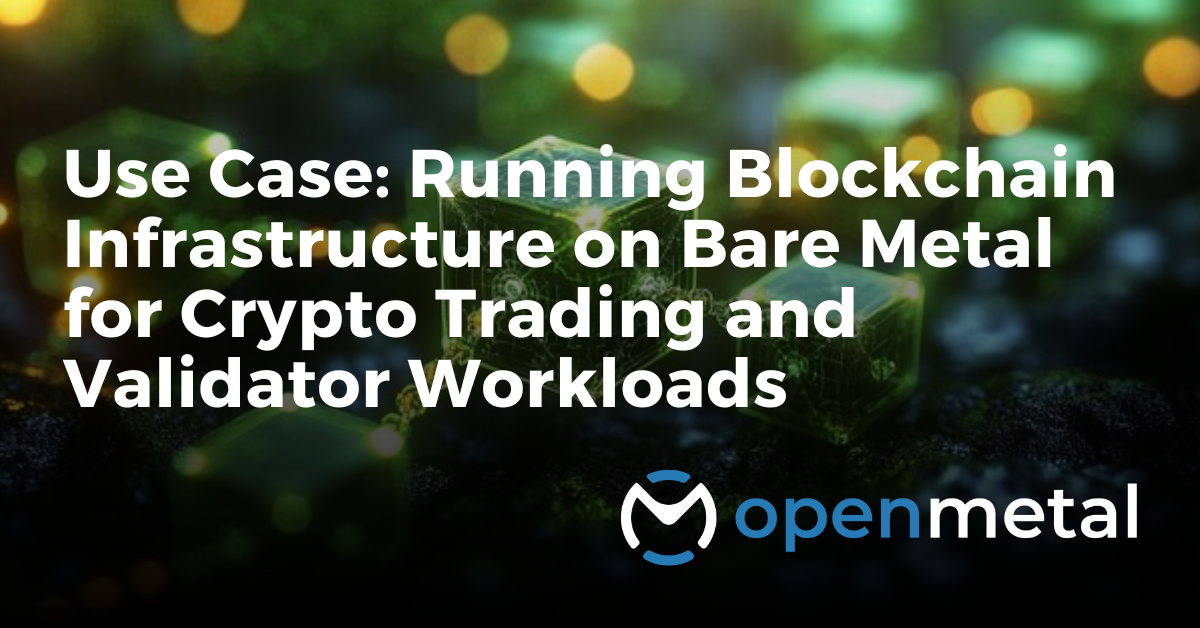
Deploying blockchain infrastructure on bare metal is essential for companies that need speed, control, and reliability. One crypto trading firm needed a low-latency, high-memory setup to support validator operations and on-chain trading. They needed consistent performance and greater flexibility than traditional cloud platforms could offer. Therefore, the team chose OpenMetal.
The Infrastructure Challenge
This trading firm needed blockchain infrastructure on bare metal and dedicated, high-memory servers capable of supporting validator workloads for the Solana blockchain. Their infrastructure had to be fast, consistent, and ready to support specialized configurations like BGP (Border Gateway Protocol) routing and polling-mode operations. Their internal Kubernetes control planes and custom networking made it critical to have direct access to hardware, with room to scale as bandwidth needs grew. In addition, they wanted to move away from hyperscaler limitations and diversify their infrastructure stack.
Infrastructure Architecture for Blockchain Trading & Validator Workloads
To meet their needs, the team deployed a pair of OpenMetal XL V4 bare metal servers. Each server featured dual Intel Xeon Gold 6526Y processors and a high memory configuration suited for data-intensive and latency-sensitive workloads. With 2TB RAM across the setup, they could run Solana validator software efficiently and operate in polling mode to reduce response time in trading scenarios. This level of performance also helps ensure precise tracking of every transaction, which is essential for accurate reporting and compliance with crypto taxes across different jurisdictions.
The infrastructure was placed in a latency-optimized data center region to maintain close proximity to other Solana validators. The configuration also supported future network enhancements such as BGP announcements and Layer 2 networking access. With Kubernetes managed externally, the environment remained flexible, yet tightly controlled.
To strengthen data protection and integrity, the servers were also configured with TPMv2 (Trusted Platform Module version 2). As a result, this provided hardware-level encryption support and secure key storage.
Benefits Delivered by OpenMetal
- Bare metal servers with high memory optimized for blockchain validators
- Consistent low-latency performance for polling-mode operations
- Future-proof networking setup with BGP and L2 support options
- Infrastructure diversity from traditional cloud providers
- Responsive support and provisioning tailored to crypto workloads
- Enhanced encryption and secure key management using TPMv2 hardware modules
Summary and Takeaway
OpenMetal provided a powerful foundation for blockchain infrastructure on bare metal for the firm’s blockchain infrastructure. With XL V4 servers and complete hardware control, they were able to support Solana validator operations with high uptime and ultra-low latency. The setup gave them room to grow, reduce cloud dependency, and support the future needs of their algorithmic trading stack. For teams building advanced blockchain infrastructure, OpenMetal delivers the performance and control needed to compete in real time.
As the firm continued expanding its crypto operations, it became clear that off-the-shelf cloud services weren’t built for the kind of precision and control required in fast-moving blockchain ecosystems. The team needed a way to manage performance at the hardware level, tune for real-time workloads, and deploy in a region that offered proximity to other Solana validators.
In selecting their infrastructure, the team focused on reliability, speed, and the ability to fine-tune system performance. Running Solana validator workloads requires not only powerful compute resources but also consistent latency and memory bandwidth. Thanks to OpenMetal’s dedicated environment, the firm could better manage peak loads, avoid noisy neighbor issues, and fine-tune their configuration for the highest availability.
Learn more about how other teams run blockchain workloads on bare metal in our related use case blog.
Read More on the OpenMetal Blog



































